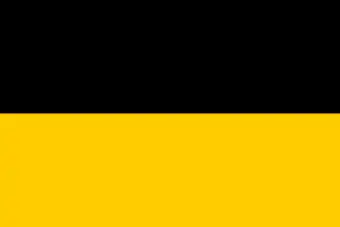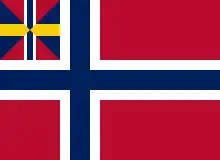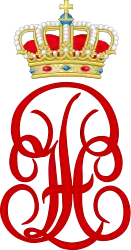Prince Philippe, Count of Flanders
Prince Philippe of Belgium, Count of Flanders (Dutch: Filips; 24 March 1837 – 17 November 1905), was the third born and second surviving son of King Leopold I of Belgium and Louise d'Orléans. He was the brother of Leopold II of Belgium and Empress Carlota of Mexico.
| Prince Philippe | |||||
|---|---|---|---|---|---|
| Count of Flanders | |||||
.jpg.webp) | |||||
| Born | 24 March 1837 Royal Castle of Laeken, Laeken, Belgium | ||||
| Died | 17 November 1905 (aged 68) Palace of the Count of Flanders, Brussels, Belgium | ||||
| Burial | |||||
| Spouse | |||||
| Issue | |||||
| |||||
| House | Saxe-Coburg and Gotha | ||||
| Father | Leopold I of Belgium | ||||
| Mother | Louise of Orléans | ||||
| Religion | Roman Catholic | ||||
| Royal styles of Philippe of Belgium, Count of Flanders | |
|---|---|
.svg.png.webp) | |
| Reference style | His Royal Highness |
| Spoken style | Your Royal Highness |
Born at the Château de Laeken, near Brussels, Belgium, Philippe was created Count of Flanders on 14 December 1840. In January 1869, upon the sudden death of his nephew Prince Leopold, Duke of Brabant, he became heir presumptive to the Belgian throne. In 1866, after the abdication of Alexandru Ioan Cuza, Prince of Romania, Philippe refused being named the new Romanian sovereign, and the throne was later accepted by Philippe's brother-in-law Carol I.[1] Earlier, he had also refused the crown of Greece, which was offered to him in 1862.
Philippe died in 1905. When his brother King Leopold II died in 1909, Philippe's second son ascended the Belgian throne as King Albert I.
Marriage and issue
On 25 April 1867 at St. Hedwig's Cathedral in Berlin, he married Marie Luise Alexandra Caroline, Princess of Hohenzollern-Sigmaringen, (1845–1912), daughter of Karl Anton von Hohenzollern (1811–1885) and his wife Josephine of Baden (1813–1900). Among Marie's siblings were the deceased Queen of Portugal and the future King of Romania.
The children of Phillipe and Marie were:
- Prince Baudouin (3 June 1869 – 23 January 1891); he died of influenza at the age of 21.
- Princess Henriette (30 November 1870 – 28 March 1948); she married Prince Emmanuel, Duke of Vendôme on 12 February 1896. They had four children.
- Princess Joséphine Marie (30 November 1870 – 18 January 1871), twin to Princess Henriette.
- Princess Joséphine Caroline (18 October 1872 – 6 January 1958); she married Prince Karl Anton of Hohenzollern on 28 May 1894. They had four children.
- King Albert I (8 April 1875 – 17 February 1934); he married Duchess Elisabeth in Bavaria on 2 October 1900. They had three children.
He died in his residence the Palace of the Count of Flanders, and is buried at the Church of Our Lady of Laeken. He was succeeded as heir presumptive to the throne by his son, Albert.
Honours
He received the following decorations and awards:[2]
- Domestic
- Grand Cordon of the Order of Leopold (civil), 24 March 1855[3]
- Foreign
 Duchy of Anhalt: Grand Cross of Albert the Bear, 1874[4]
Duchy of Anhalt: Grand Cross of Albert the Bear, 1874[4] Austrian Empire: Grand Cross of St. Stephen, 1857[5]
Austrian Empire: Grand Cross of St. Stephen, 1857[5].svg.png.webp) Baden:
Baden:
- Knight of the House Order of Fidelity, 1862[6]
- Grand Cross of the Zähringer Lion
.svg.png.webp) Kingdom of Bavaria: Knight of St. Hubert
Kingdom of Bavaria: Knight of St. Hubert.svg.png.webp) Empire of Brazil: Grand Cross of the Southern Cross
Empire of Brazil: Grand Cross of the Southern Cross Denmark: Knight of the Elephant, 1 November 1875[7]
Denmark: Knight of the Elephant, 1 November 1875[7].svg.png.webp)
.svg.png.webp)
.svg.png.webp) Ernestine duchies: Grand Cross of the Saxe-Ernestine House Order, December 1853[8]
Ernestine duchies: Grand Cross of the Saxe-Ernestine House Order, December 1853[8].svg.png.webp) French Empire: Grand Cross of the Legion of Honour
French Empire: Grand Cross of the Legion of Honour.svg.png.webp) Holy See: Grand Cross of the Holy Sepulchre of Jerusalem[9]
Holy See: Grand Cross of the Holy Sepulchre of Jerusalem[9].svg.png.webp) Sovereign Military Order of Malta: Bailiff Grand Cross of Honour and Devotion[10]
Sovereign Military Order of Malta: Bailiff Grand Cross of Honour and Devotion[10].svg.png.webp) Empire of Japan: Grand Cordon of the Order of the Chrysanthemum, 5 November 1898[11]
Empire of Japan: Grand Cordon of the Order of the Chrysanthemum, 5 November 1898[11] Netherlands: Grand Cross of the Netherlands Lion
Netherlands: Grand Cross of the Netherlands Lion Luxembourg: Knight of the Gold Lion of Nassau
Luxembourg: Knight of the Gold Lion of Nassau.svg.png.webp) Ottoman Empire: Order of Osmanieh, 1st Class
Ottoman Empire: Order of Osmanieh, 1st Class.svg.png.webp) Kingdom of Portugal: Grand Cross of the Tower and Sword, 12 December 1854[12]
Kingdom of Portugal: Grand Cross of the Tower and Sword, 12 December 1854[12].svg.png.webp) Kingdom of Prussia:
Kingdom of Prussia:
- Knight of the Black Eagle, 7 October 1855; with Collar, 1861[13]
- Grand Cross of the Red Eagle
- Grand Commander's Cross of the Royal House Order of Hohenzollern, 4 May 1867[13]
 Kingdom of Romania: Grand Cross of the Star of Romania
Kingdom of Romania: Grand Cross of the Star of Romania Russian Empire:
Russian Empire:
.svg.png.webp) Saxe-Weimar-Eisenach: Grand Cross of the White Falcon, 20 September 1854[14]
Saxe-Weimar-Eisenach: Grand Cross of the White Falcon, 20 September 1854[14].svg.png.webp) Kingdom of Saxony: Knight of the Rue Crown, 1857[15]
Kingdom of Saxony: Knight of the Rue Crown, 1857[15].svg.png.webp) Spain:
Spain:
- Grand Cross of the Order of Charles III, 6 April 1863[16]
- Knight of the Golden Fleece, 21 January 1872[17]
.svg.png.webp)
 Sweden-Norway:[18]
Sweden-Norway:[18]
- Knight of the Seraphim, 17 May 1856
- Grand Cross of St. Olav, 25 July 1860
 Württemberg: Grand Cross of the Württemberg Crown, 1864[19]
Württemberg: Grand Cross of the Württemberg Crown, 1864[19]
Arms
.svg.png.webp) Coat of Arms of the Count of Flanders (1837-1909)
Coat of Arms of the Count of Flanders (1837-1909) Royal Monogram of Prince Philippe of Belgium, Count of Flanders
Royal Monogram of Prince Philippe of Belgium, Count of Flanders
Ancestry
| Ancestors of Prince Philippe, Count of Flanders |
|---|
Notes
- Keith Hitchins (1994). Rumania, 1866–1947. Oxford University Press. p. 13. ISBN 0-19-822126-6.
- A. Manceaux, Imprimeur-Libraire, ed. (1905). Almanach de poche de Bruxelles et de ses faubourgs (in French). Brussels. p. 8.
{{cite book}}: CS1 maint: location missing publisher (link) - "Liste des Membres de l'Ordre de Léopold", Almanach Royal Officiel (in French), 1856, p. 47 – via Archives de Bruxelles
- Hof- und Staats-Handbuch für des Herzogtum Anhalt (1883), "Herzoglicher Haus-Orden Albrecht des Bären" p. 16
- "A Szent István Rend tagjai" Archived 22 December 2010 at the Wayback Machine
- Hof- und Staats-Handbuch des Großherzogtum Baden (1865), "Großherzogliche Orden" p. 55
- Jørgen Pedersen (2009). Riddere af Elefantordenen, 1559–2009 (in Danish). Syddansk Universitetsforlag. p. 463. ISBN 978-87-7674-434-2.
- Staatshandbücher für das Herzogtums Sachsen-Altenburg (1869), "Herzogliche Sachsen-Ernestinischer Hausorden" p. 17
- Almanach royal officiel de Belgique. Librairie polytechnique De Decq. 1870. p. 17.
- Justus Perthes, Almanach de Gotha 1905 (1905) page 19
- 刑部芳則 (2017). 明治時代の勲章外交儀礼 (PDF) (in Japanese). 明治聖徳記念学会紀要. p. 149.
- Bragança, Jose Vicente de (2014). "Agraciamentos Portugueses Aos Príncipes da Casa Saxe-Coburgo-Gota" [Portuguese Honours awarded to Princes of the House of Saxe-Coburg and Gotha]. Pro Phalaris (in Portuguese). 9–10: 10. Retrieved 28 November 2019.
- "Schwarzer Adler-orden", Königlich Preussische Ordensliste (in German), vol. 1, Berlin, 1886, pp. 5, 934 – via hathitrust.org
{{citation}}: CS1 maint: location missing publisher (link) - Staatshandbuch für das Großherzogtum Sachsen / Sachsen-Weimar-Eisenach. "Großherzogliche Hausorden" p. 13. Weimar: Böhlau, 1859.
- Staatshandbuch für den Freistaat Sachsen (1867) (in German), "Königliche Ritter-Orden", p. 4
- "Real y distinguida orden de Carlos III". Guía Oficial de España (in Spanish): 179. 1904. Retrieved 21 March 2019.
- "Caballeros de la insigne orden del toisón de oro". Guía Oficial de España (in Spanish): 172. 1904. Retrieved 21 March 2019.
- Sveriges och Norges statskalender. Liberförlag. 1874. pp. 468, 703.
- Hof- und Staats-Handbuch des Königreich Württemberg (1907), "Königliche Orden" p. 27
References
- Weintraub, Stanley, Uncrowned King: The Life of Prince Albert, The Free Press, New York, 1997, p. 458.
- Willis, Daniel (also known as Daniel A. Brewer-Ward), The Descendants of Louis XIII, Clearfield Co., Inc., Baltimore, Maryland, 1999, ISBN 0-8063-4942-5, p. 99.
- NEXUS Jan/Feb 1998, Vol. XV, No. 1, p. 32.
Literature
Damien Bilteryst, Philippe Comte de Flandre, Frère de Léopold II, Bruxelles, Editions Racine, juin 2014, 336 p. ISBN 978-2-87386-894-9